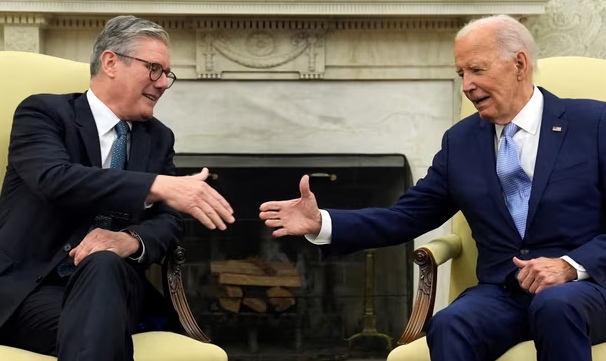Britain’s new prime minister Starmer received a present at a meeting with US President Joe Biden – an endorsement from the “strongest ally” of the plan to move closer to the European Union, POLITICO reports.
President Joe Biden handed the perfect gift to Keir Starmer when the new British prime minister arrived at the White House on Wednesday. No, not a pair of aviators – Biden’s calling card – given to Starmer as an official gift through the usual diplomatic channels.
The real prize for Starmer was the endorsement his plan to bring Britain closer to the EU after Brexit received from its most powerful ally. Biden said at the start of his first meeting with the new British PM:
“I kind of see you guys as the knot tying the transatlantic alliance together, the closer you are with Europe, the more you’re engaged.”
Downing Street was quick to seize the moment. Summarising the bilateral summit, a UK government spokesman stressed that “the President welcomed the Prime Minister’s recent remarks on building closer relations with our European colleagues.”
In private conversation, No 10 was delighted with Biden’s comments, taken as justification for how quickly the new Labour government was changing UK foreign policy.
Starmer’s desire for a fundamental shift to a more Eurocentric Britain – including greater defence cooperation and a renegotiation of Boris Johnson’s Brexit trade deal – has always been part of Labour’s policy platform. But the rapid pace at which the new prime minister is moving towards that goal has come as a surprise.
In opposition, Starmer has often shied away from talking about Brexit or the UK’s future relationship with the EU, emphasising only that his government will not re-enter the single market or customs union.
“Britain has a place on the world stage”
The Labour leader was determined not to let his election battle turn into an argument about renegotiating Brexit, and did not want to remind people of his past calls for a second referendum on the EU. But now that Starmer has won a convincing victory, he has immediately set about implementing his plan to bring the UK and the EU closer together as his main foreign policy goal.
At his press conference at the end of the NATO summit, the Prime Minister declared that “Britain has a place on the world stage” and that he was “determined to rebuild our relationship with Europe.”
He also clearly articulated the message to Britain’s European allies in words very similar to those used by Biden when he first became president. Starmer said:
“The UK is back. It’s confident, we want to play our part on the world stage. For very many people there was a sense after Brexit that the UK had become too inward-looking, was not as interested as it once was in its place on the global stage.”
The Democratic congressman, speaking candidly on condition of anonymity, like the other authors of this article, told POLITICO that such a foreign policy stance would lead to a closer relationship between Britain and the United States – as long as Biden remains in the White House. He said:
“Starmer’s election comes after a period of Conservative hostility toward the EU and, frankly, to a number of us on Capitol Hill who were concerned about Brexit’s implications on the Good Friday Agreement [delivering peace in Northern Ireland].”
Defence pact
Top on the Starmer government’s agenda as it returns to Europe is the signing of a defence pact between the UK and the EU.
The UK government wants formal channels for discussing defence policy and to facilitate cooperation between British and European defence companies. The pact could also make it easier for Europe to coordinate defence policy amid calls on both sides of the Atlantic for NATO’s European flank to become more self-sufficient.
Starmer said on Thursday that talks on the pact had begun with other European leaders during the NATO summit and would intensify next week at the European Policy Community (EPC) in southeast England.
UK Defence Secretary John Healey told reporters in Washington that the UK was also interested in deeper involvement in Permanent Structured Cooperation (PESCO), the EU’s defence policy blueprint.
A senior NATO official said the alliance was broadly supportive of the UK signing a pact with the EU – provided it did not lead to increased protectionism in the defence sector. He also added:
“We welcome the fact the EU is doing more on security. It’s got to be done in a way which is complimentary and recognises NATO having the paramount role in security.”
That message reached London. Starmer told British journalists on the way to the summit that the pact would “complement NATO”. Starmer said:
“NATO is still the cornerstone of defence in Europe and our approach on defence has always been NATO-first.”
Talk is cheap
Despite the exuberant rhetoric, the UK may find its broader goals proving difficult to achieve. Efforts to ease trade barriers by reducing checks on trade in goods between the UK and EU countries look particularly difficult.
One European government official told POLITICO that the UK will certainly have “certain common interests, especially in the areas of security and defence. But they reiterated that there would be “no choice” of benefits for EU members. Brussels is certain to demand significant concessions for any changes to the relationship after Brexit.
Starmer also realises that Biden’s endorsement could be a brief moment of harmony before a more complex transatlantic relationship. By January, the British prime minister could be dealing with a US president who sees the EU and the very idea of multilateral engagement as a waste of time.
If Donald Trump returns to the White House, Starmer can expect the high praise for his internationalist instincts to cease immediately.
